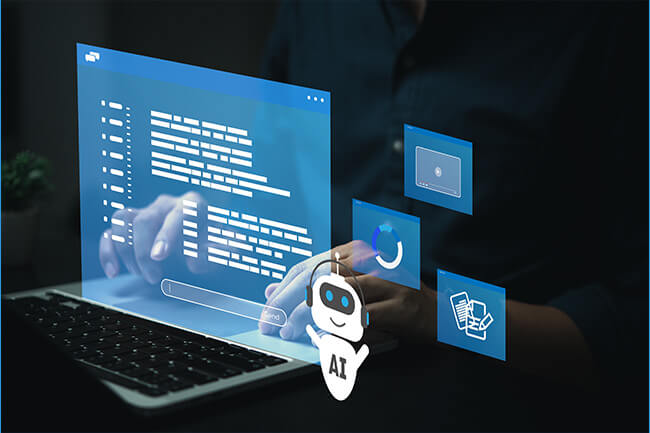AI has transformed content marketing by automating tasks, providing data-driven insights, and delivering personalized experiences. Content creation is made easier with AI-generated written and visual content through natural language processing algorithms. Marketers can optimize their content for search engines using AI tools that suggest keywords, headlines, and SEO improvements.
Personalization is enhanced as AI algorithms analyze user data to create tailored recommendations, emails, and dynamic website content. Chatbots and virtual assistants powered by AI offer instant support, collect data, and provide personalized content. AI algorithms curate and filter relevant content from vast amounts of information, simplifying content discovery and sharing. Data analysis helps marketers make informed decisions, refine strategies, and identify content gaps.
Predictive analytics allow for anticipating trends and customer behaviour. Voice search optimization is improved with AI-powered voice recognition and natural language processing. Overall, AI empowers content marketers to create high-quality, personalized content, automate tasks, and engage audiences effectively in today’s competitive landscape.
How is AI Transforming Content Marketing?
AI is transforming content marketing in several ways, revolutionizing the entire process from creation to distribution and analysis.
Here’s how AI is reshaping content marketing:
- Automated Content Creation: AI algorithms, powered by natural language processing, can generate written content, such as blog posts, social media updates, and product descriptions. Marketers can utilize AI tools to automate the creation of content, saving time and resources while ensuring consistency and quality.
- Content Optimization: AI technology assists in optimizing content for search engines and improving its performance. AI-powered tools can analyze data, recommend keywords, suggest changes to improve SEO, and enhance the overall visibility of content in search results. This helps marketers improve their content’s reach and organic traffic.
- Personalization at Scale: AI enables marketers to deliver personalized content experiences at scale. By analyzing user data, AI algorithms can understand individual preferences, behaviors, and purchase history. This information allows marketers to create targeted and personalized content, such as recommendations, emails, and website experiences, that resonate with each user.
- Enhanced Customer Experiences with Chatbots: AI-powered chatbots and virtual assistants are transforming customer experiences. Chatbots can provide instant responses, handle basic inquiries, offer product recommendations, and guide users through the sales funnel. They can collect valuable data that helps in understanding customer needs and preferences, leading to improved content creation and tailored experiences.
- Content Curation and Recommendations: AI algorithms excel at filtering and curating content from vast amounts of information available online. They can identify and recommend relevant and valuable content to users, helping marketers streamline the process of content curation and sharing. This ensures that users receive the most useful and engaging content.
- Data Analysis and Insights: AI technology enables marketers to analyze large volumes of data quickly and efficiently. AI algorithms can extract valuable insights from user behavior, content performance, and market trends. This data-driven approach helps marketers make informed decisions, identify content gaps, and refine their content strategies for better results.
- Predictive Analytics: AI algorithms can leverage historical data to predict customer behavior, preferences, and trends. Marketers can use these predictions to anticipate content demand, create personalized campaigns, and optimize content distribution across various channels.
- Voice Search Optimization: AI-powered voice recognition and natural language processing algorithms enable marketers to understand user intent and optimize content to match voice search queries. This ensures that their content remains relevant and visible in voice search results.
SEO and its Role in Content Marketing
Content audit and analysis play a crucial role in SEO, which is a fundamental component of content marketing. SEO drives organic traffic, enhances visibility, and improves user experience. By optimizing content for relevant keywords and improving website structure, marketers can reach their target audience and establish authority. SEO emphasizes content quality, relevance, and long-term results, contributing to business growth. A well-executed SEO strategy is essential for maximizing content reach, engagement, and overall impact in the competitive digital landscape.
Benefits of AI in Content Marketing
- AI enhances efficiency by automating content-related tasks, saving time and resources.
- AI enables personalized content experiences at scale by analyzing user data and tailoring recommendations, emails, and website experiences.
- AI improves content optimization by suggesting SEO improvements, keywords, headlines, and meta tags to boost visibility in search results.
- AI-driven data analysis provides valuable insights about content performance, audience behavior, and market trends, aiding data-driven decision-making.
- AI-powered chatbots and virtual assistants enhance customer experiences by providing instant support, personalized recommendations, and guided assistance.
- AI algorithms curate and recommend relevant content, simplifying content curation and increasing content discovery for marketers.
- AI leverages historical data for predictive analytics, allowing marketers to anticipate content demand, create targeted campaigns, and optimize content distribution.
- AI optimizes content for voice search by utilizing voice recognition and natural language processing, ensuring visibility in voice search results.
Challenges of Using AI in Content Marketing
Using AI in content marketing comes with challenges that include maintaining quality and authenticity, addressing data privacy and ethics concerns, acquiring the necessary expertise, integrating AI with existing systems, preventing biases, keeping up with advancements, managing costs and ROI, and building user trust. Marketers must navigate these challenges to effectively leverage AI in their content strategies.
How to Leverage AI in Content Marketing to Enhance SEO Results
To leverage AI in content marketing for enhanced SEO results, follow these strategies:
- Conduct AI-driven keyword research.
- Utilize AI-generated content with human refinement.
- Optimize SEO using AI-based tools.
- Personalize content based on AI analysis of user data.
- Optimize content for voice search using AI-powered natural language processing.
- Curate relevant content using AI algorithms.
- Analyze data with AI-driven tools for actionable insights.
- Enhance user experience with AI chatbots for improved engagement.
Implementing these strategies helps improve SEO performance, increase organic traffic, and deliver a personalized and optimized content experience to users.
Ethical Considerations
Ethical considerations when using AI in content marketing include data privacy, bias mitigation, transparency, accountability, human oversight, user empowerment, and continuous monitoring for improvement. Prioritizing these considerations ensures responsible and ethical use of AI in content marketing.
Maintaining Human Touch in AI-Driven Content Marketing
To maintain a human touch in AI-driven content marketing:
- Combine AI-generated content with human refinement.
- Personalize content with human insights.
- Infuse authentic storytelling and emotions.
- Incorporate interactive experiences for engagement.
- Foster collaboration and feedback between AI and humans.
- Ensure transparency in AI usage.
- Continuously learn and adapt based on performance and feedback.
These strategies ensure that AI-driven content marketing retains a human touch, resulting in engaging and authentic experiences for the audience.
Exploring AI Tools: Areas for Testing and Evaluation
As AI advances, businesses are embracing AI-powered tools to elevate their content marketing strategies. These tools automate tasks, boost efficiency, and deliver personalized and engaging content. However, thorough testing and evaluation are crucial before fully integrating AI into content marketing workflows to ensure effectiveness and capabilities align with business goals.
Let’s explore 5 key areas where AI tools can be tested and evaluated for content marketing purposes.
- Content Creation and Generation: Quickly and effectively automate the content creation process using these incredible tools. Use the time to test what’s available and where their strengths are, you never know where you may find a helping hand.
- Content Curation and Recommendation: AI tools can assist in curating relevant and personalized content for specific audiences. Testing these tools involves evaluating their ability to analyze user preferences, interests, and behavior to recommend appropriate content. Accuracy in content recommendations, diversity of suggested content, and the ability to adapt and learn from user feedback are essential aspects to consider during evaluation.
- Audience Insights and Analytics: Using these tools can provide valuable insights into your audiences behaviour and preferences. The ore you test these tools, the more accurate they’ll be. Evaluating the tool’s reporting capabilities, data visualization, and the ease of extracting actionable insights are critical factors in this area.
- Natural Language Processing and Understanding: AI tools that leverage natural language processing (NLP) can analyze and understand human language, enabling advanced features such as sentiment analysis, topic extraction, and language translation. Testing NLP capabilities involves evaluating the accuracy of language comprehension, the tool’s ability to identify sentiment and context accurately, and its effectiveness in handling different languages and dialects.
- Optimization and Personalization: AI tools can optimize content performance by analyzing data and making data-driven recommendations for improvement. Testing these tools involves evaluating their ability to analyze key performance indicators (KPIs), such as click-through rates, conversions, and engagement metrics. Assessing the tool’s effectiveness in personalizing content based on user behavior, preferences, and segmentation is also crucial in determining its value for content marketing strategies.
Brands Applying AI in Content Marketing: Real-World Examples
AI in content marketing has yielded impressive results for numerous brands, showcasing its transformative potential.
Here are a few examples of how AI has been successfully implemented:
- FitBite: FitBite, a meal delivery service, leverages AI to offer personalized nutrition plans. Using machine learning algorithms, the platform analyzes users’ dietary preferences, health goals, and dietary restrictions to create customized meal recommendations. This AI-driven approach ensures that customers receive tailored meal options that cater to their specific needs.
- Wanderlust Travel Co.: Wanderlust Travel Co., a travel agency, utilizes AI to enhance its content marketing efforts. By employing natural language processing, sentiment analysis, and image recognition algorithms, they analyze customer feedback, social media posts, and online reviews to understand travelers’ preferences and sentiments. This valuable data enables them to craft targeted content, recommend personalized travel experiences, and refine their marketing strategies.
- FashionForward: FashionForward, an online fashion retailer, harnesses AI to provide personalized styling advice to its customers. Through virtual try-on tools and AI-powered algorithms, customers can upload their photos or input their body measurements to receive personalized recommendations on clothing sizes, styles, and outfit combinations. This AI-driven approach enhances the shopping experience, boosts customer satisfaction, and reduces returns.
Conclusion
AI has revolutionized content marketing, providing numerous advantages such as personalized experiences, enhanced SEO, streamlined workflows, and data-driven insights. From delivering tailored content to optimizing recommendations and boosting engagement, AI has proven its value across diverse industries.
With the constant evolution of AI, marketers have unprecedented opportunities to create highly targeted, relevant, and impactful content that truly connects with their audience. By embracing AI’s potential, brands can gain a competitive edge in the digital landscape and drive substantial business growth.




